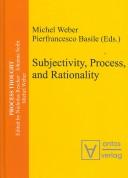| Listing 1 - 2 of 2 |
Sort by
|
Book
ISBN: 311032783X 9783110327830 3868380116 9783868380118 9783110327458 3110327457 9783868380118 Year: 2008 Volume: v. 19 Publisher: Heusenstamm Ontos
Abstract | Keywords | Export | Availability | Bookmark
 Loading...
Loading...Choose an application
- Reference Manager
- EndNote
- RefWorks (Direct export to RefWorks)
William James's moral philosophy is neither a remaking of utilitarianism nor it is a theory of values as it is assumed by the majority of his interpreters. Instead James offers an ethical view consistently arising out of valorization of energy of his days, and effecting a counter-tendency to the two great popular scientific currents of the 19th century: the universalizing of Darwinism and the pessimistic ideologies of social entropy. James's ethics moves away from the traditional idealistic or utilitarian grounds and takes place against the background of an up-and-coming philosophical
Ethics --- Deontology --- Ethics, Primitive --- Ethology --- Moral philosophy --- Morality --- Morals --- Philosophy, Moral --- Science, Moral --- Philosophy --- Values --- History --- James, William, --- Dzhems, Uilʹi︠a︡m, --- Jaymz, Vīlyām, --- جىمز، وىلىام --- Contributions in ethics. --- James, William


ISBN: 3110328364 9783110328363 311032802X 9783110328028 9783938793572 3938793570 9783110328028 Year: 2013 Volume: v. 12 Publisher: Berlin Boston
Abstract | Keywords | Export | Availability | Bookmark
 Loading...
Loading...Choose an application
- Reference Manager
- EndNote
- RefWorks (Direct export to RefWorks)
William James's Varieties of Religious Experience is one of the most renowned works of the famous psychologist and founder of pragmatism, and a fully accomplished anthropological analysis of the phenomenon of religion. In this book a selection of 10 papers from international scholars, previously presented at the International Centennary Conference in Celebration of The Gifford Lectures at University of Edinburgh in 2002, explore the theoretical and historical 'fringes' of James's work in the attempt to provide new insights into some major issues involved therein. The book is divided into two p
Experience (Religion) --- Psychology, Religious --- James, William,
| Listing 1 - 2 of 2 |
Sort by
|

 Search
Search Feedback
Feedback About UniCat
About UniCat  Help
Help News
News